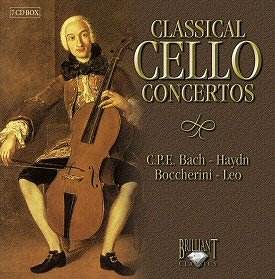|

Classical Cello Concertos
CD1
Carl Philipp Emanuel BACH
(1714-1788)
Cello Concerto No. 1 in A minor Wq. 170
(H.432)
Cello Concerto No. 3 in A major Wq. 172 (H.439)
Cello Concerto No. 2 in B flat major Wq. 171
(H.436)
Balázs Máté (cello)
Concerto Armonico/Péter Szüts
On authentic instruments Recording: 1995 Licensed
from Hungaroton, Hungary. Brilliant Classics
DDD STEMRA 92198/1
CD2
Luigi BOCCHERINI (1743-1805)
Cello Concerto in E flat major, No.12
(G deest)
Cello Concerto in G major, No.7 (G 480)
Cello Concerto in A major, No.2 (G 475)
Cello Concerto in C major, No.11 (G 573)
Julius Berger (cello)
South-West German Chamber Orchestra, Pforzheim/Vladislav
Czarnecki
Recording: 1988, Matthäuskirche, Pforzheim,
Germany. Producer: Teije van Geest Licensed
from EBS, Germany Brilliant Classics DDD STEMRA
92198/2
CD3
Luigi BOCCHERINI (1743-1805)
Cello Concerto in D major, No.6 (G 479)
Cello Concerto in B flat major, No.9 (G 482)
Cello Concerto in C major, No.4 (G 477)
Cello Concerto in D major, No.3 (G 476)
Julius Berger (cello)
South-West German Chamber Orchestra, Pforzheim/Vladislav
Czarnecki
Recording: 1988, Matthäuskirche, Pforzheim,
Germany. Producer: Teije van Geest Licensed
from EBS, Germany Brilliant Classics DDD STEMRA
92198/3
CD4
Luigi BOCCHERINI
(1743-1805)
Cello Concerto in D major, No.5 (G 478)
Cello Concerto in E flat major, No.1 (G 474)
Cello Concerto in C major, No.8 (G 481)
Cello Concerto in D major, No.10 (G 483)
Julius Berger (cello)
South-West German Chamber Orchestra, Pforzheim/Vladislav
Czarnecki
Recording: 1988, Matthäuskirche, Pforzheim,
Germany. Producer: Teije van Geest Licensed
from EBS, Germany Brilliant Classics DDD STEMRA
92198/4
CD5
Leonardo LEO (1694-1744)
Cello Concerto in D major (L 10)
Cello Concerto in A major (L 20)
Sinfonie concertante for cello and strings in
C minor (L 30)
Julius Berger (cello)
South-West German Chamber Orchestra, Pforzheim/Vladislav
Czarnecki
Recording: 29-31 May 1999, Kirnbachhalle, Niefern-Öschelbronn,
Germany. Producer & engineer: Reinhard Geller
Licensed from EBS, Germany Brilliant Classics
DDD STEMRA 92198/5
CD6
Leonardo LEO (1694-1744)
Cello Concerto in F minor (L 40)
Cello Concerto in A major (L 50)
Cello Concerto in D minor (L 60)
Julius Berger (cello)
South-West German Chamber Orchestra, Pforzheim/Vladislav
Czarnecki
Recording: 5-7 July 1999, Kirnbachhalle in Niefern-Öschelbronn,
Germany. Producer & engineer: Reinhard Geller
Licensed from EBS, Germany Brilliant Classics
DDD STEMRA 92198/6
CD7
Joseph HAYDN
(1732-1809)
Cello Concerto in D major Hob. VIIb:
2
Cello Concerto in C major Hob. VIIb: 1
Miklós Perényi (cello)
Liszt Ferenc Chamber Orchestra/János
Rolla
Recording: 1979 Producer: Zoltán Hézser
Licensed from Hungaroton, Hungary. Brilliant
Classics ADD STEMRA 92198/7
 BRILLIANT CLASSICS 92198 [7 CDs: 68:57 +
63:26 + 72:37 + 74:42 + 37:21 + 44:03 + 50:38]
BRILLIANT CLASSICS 92198 [7 CDs: 68:57 +
63:26 + 72:37 + 74:42 + 37:21 + 44:03 + 50:38]
|

